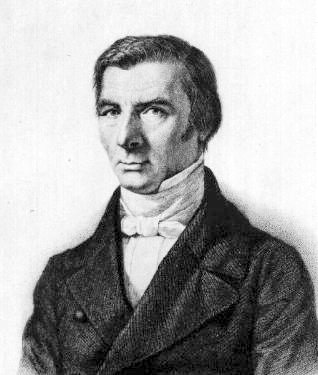Frédéric Bastiat
Frédéric Bastiat (June 30, 1801 - December 24, 1850) is a well-known french classical liberal author and economist.
Born Claude Frédéric Bastiat in Bayonne, Aquitaine, France. He is very much appreciated by most libertarians for both his very lively and understandable style and his deep theoretical insight.
 |
His public career as economist started only in 1844, and ended with his untimely death in 1850. Bastiat had caught tuberculosis, probably during his tours throughout France to promote libertarian ideas, and that illness eventually prevented him from making further speeches (particularly at the legislative assembly to which he was elected in 1848 and 1849) and took his life.
Bastiat definitely embodies the "Harmonic" school of libertarians, who consider utilitarian and natural law arguments as two complementary aspects of a same world.
Bastiat did not take part in the anarchist vs minarchist debate (he arguably died too early for that); he seems to have considered the State as something inevitable as far as immediate practical things matter, something that ought to be taken into account as long as it existed. He also explicitly deplored violent revolution as a way to get rid of governments. Finally, his friend Gustave de Molinari did publish his foundational work on free market anarchism in 1849, and Bastiat, knowing that, did declare on his death bed that Molinari was his spiritual heir.
Bastiat is the author of the satirical document best known as the "Candlemakers' petition" which presents itself as a petition from candle-makers to the French government to block out the Sun to prevent its unfair competition with their products. Bastiat is also the author of The Law, originally published as a pamphlet in 1850.
His stress on the role of consumer demand in initiating economic progress meant that he was seen as a forerunner of the Austrian School.
He described the concept of tax revenue diminishing as tax rates are increased beyond a certain threshold. The concept is today referred to as the Laffer Curve.
Frédéric Bastiat died in Rome, Italy on December 24, 1850.
See also
References
- Mondo Politico Library's presentation of Frederic Bastiat's book, The Law (Dean Russell translation; full text; formatted for easy on-screen reading)
- The Library of Economics and Liberty publishes most english translations of his works.
- Bastiat.org publishes or indexes all about Bastiat.
- The Cercle Frederic Bastiat also publishes about Bastiat, and promotes the same tradition of libertarianism.
- The Candlemakers' Petition - English translation
- Biography with Literature index